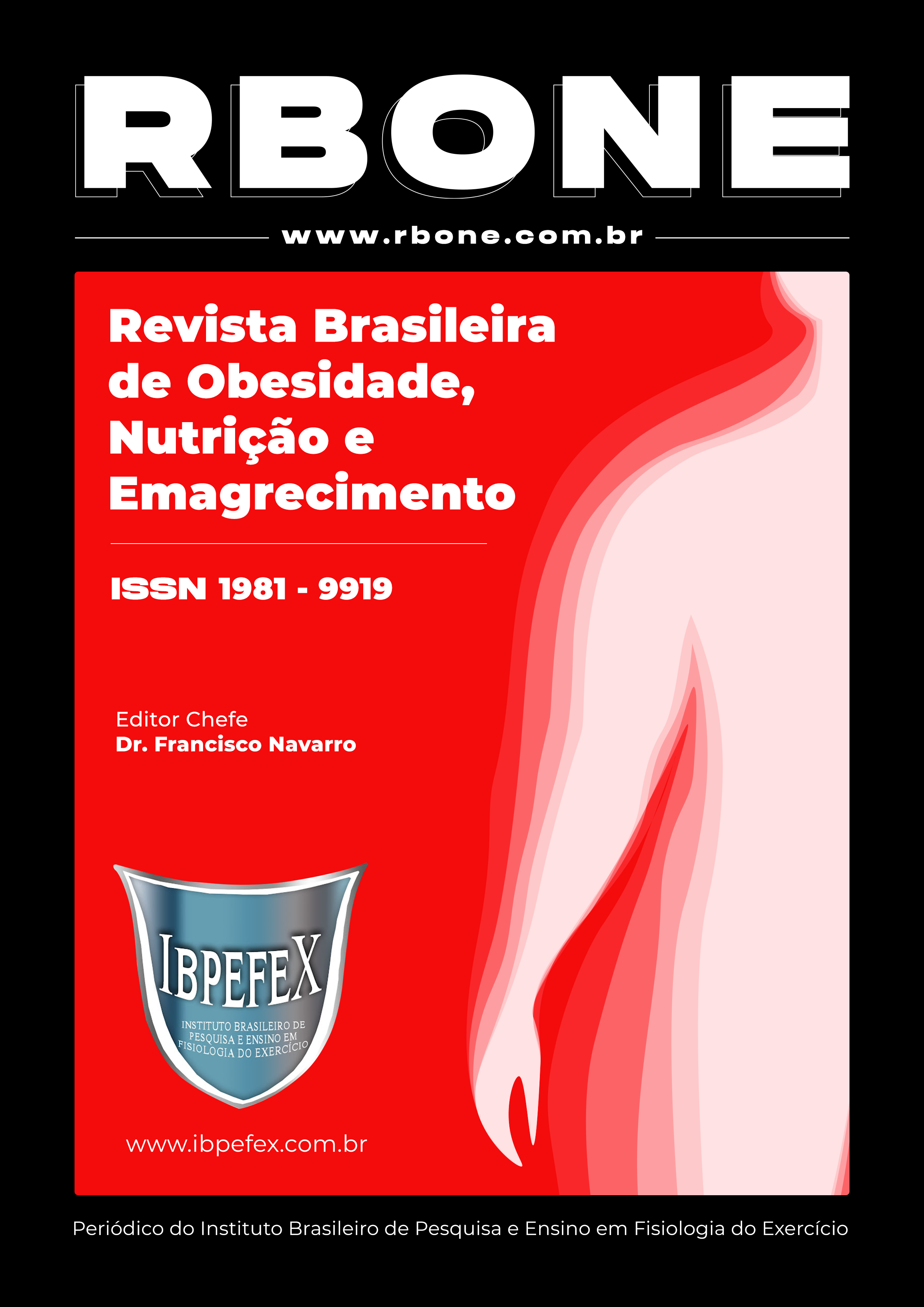Consumption of unhealthy food and its relationship with levels of stress, anxiety and sleep quality in students at a higher education institution during the COVID-19 quarantine period
Abstract
Introduction: The social isolation imposed by the COVID-19 pandemic has contributed to a sedentary lifestyle and increased the consumption of ultra-processed foods. Objective: To evaluate the consumption of unhealthy foods and their connection with levels of stress, anxiety and sleep quality in students of a Higher Education Institution during the Covid-19 quarantine period. Materials and Methods: Cross-sectional study, with university academics. The following variables were evaluated: sociodemographic and clinical; changes in behavior related to lifestyle during the pandemic and food consumption through the instrument of the Food and Nutritional Surveillance System (SISVAN). Statistical analysis was performed using the SPSS® version 21 program, with p<0.05 being considered statistically significant. Results and discussion: 130 students participated, 88.7% female, mean age 25 (±7.6) years. Among the participants, 43.9% reported weight gain and 18.5% weight loss in this period. Consumption of fried and salty foods for two days or more was associated with reduced sleep quality and higher prevalence of stress and anxiety levels (p<0.05). Conclusion: The association found between consumption of unhealthy foods and increased levels of stress, anxiety and reduced quality of sleep, highlight the close relationship between emotional triggers and food choices. This reinforces the importance of nutritional education with a view to eating behavior, aiming at intuitive eating in the face of stressful situations.
References
-Barros, M.B.A.; e colaboradores. Relato de tristeza/depressão, nervosismo/ansiedade e problemas de sono na população adulta brasileira durante a pandemia de COVID-19. Epidemiol. Serv. Saúde, Brasília. Vol. 29. Num. 4. 2020. p. e2020427. 2020.
-Brasil. Ministério da Saúde. Qual é a relação entre o consumo de ultraprocessados e risco de mortalidade? 07/07/2022.
-Brasil. Ministério da Saúde, UNA-SUS. Diabetes, hipertensão e obesidade avançam entre os brasileiros. 27/04/2020.
-Camargo, L.C.; e colaboradores. Qualidade do sono em universitários no contexto da pandemia da COVID-19: um olhar multifatorial. Rev. Psicol. Saúde e Debate. Vol. 8. Num. 1. 2022. p. 97-124.
-Cazal, M.M.; e colaboradores. Hábitos de vida durante a pandemia da COVID-19: repercussões no peso corporal e nos níveis de ansiedade. Scientia Medica. Vol. 31. 2021. p. 1-9.
-Lima, B.S.; e colaboradores. O impacto da pandemia por COVID-19 nos hábitos alimentares dos estudantes de medicina. Revista Brasileira de Nutrição Esportiva. São Paulo. Vol. 16. Num. 97. 2022. p. 135-142.
-Malta, D.C.; e colaboradores. A pandemia da COVID-19 e as mudanças no estilo de vida dos brasileiros adultos: um estudo transversal, 2020. Revista Epidemiologia e Serviços de Saúde. Vol. 29. Num. 4. 2020. p. e2020407.
-Medeiros, E. B.; e colaboradores. A influência do comfort food na saúde: uma revisão. Research, Society and Development. Vol. 11. Num. 15. 2022. p. e545111537490.
-Mota, I. A.; e colaboradores. Impacto da COVID-19 nos hábitos alimentares, atividade física e sono em profissionais de saúde brasileiros. Arquivos de Neuro-Psiquiatria. Vol. 79. Num. 5. 2021. p. 429-436.
-Paixão, G.M.; e colaboradores. Participação ocupacional, estresse, ansiedade e depressão em trabalhadores e estudantes de universidades brasileiras durante a pandemia de COVID-19. Cadernos Brasileiros de Terapia Ocupacional. Vol. 30. 2022. p. e2952.
-Quadra, M.R.; e colaboradores. Influência do sono e da crononutrição na hipertensão e diabetes: um estudo de base populacional. Cad. Saúde Pública. Vol. 38. Num. 6. 2022. p. e00291021.
-Teodoro, M.L.M.; e colaboradores. Saúde mental em estudantes universitários durante a pandemia de COVID-19. Revista Família, Ciclos de Vida e Saúde no Contexto Social. Vol. 9. Num. 2. 2021.
Copyright (c) 2024 Luide Hoffmann, Bruna Bellincanta Nicoletto Gehrke, Pâmela Antoniazzi dos Santos, Josiane Siviero, Verônica Bohm, Karen Mello de Mattos Margutti

This work is licensed under a Creative Commons Attribution-NonCommercial 4.0 International License.
Authors who publish in this journal agree to the following terms:
- Authors retain the copyright and grant the journal the right of first publication, with work simultaneously licensed under the Creative Commons Attribution License BY-NC which allows the sharing of the work with acknowledgment of the authorship of the work and initial publication in this journal.
- Authors are authorized to enter into additional contracts separately for non-exclusive distribution of the version of the work published in this journal (eg, publishing in institutional repository or book chapter), with acknowledgment of authorship and initial publication in this journal.
- Authors are allowed and encouraged to post and distribute their work online (eg, in institutional repositories or on their personal page) at any point before or during the editorial process, as this can bring about productive change as well as increase impact and impact. citation of published work (See The Effect of Free Access).






